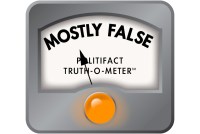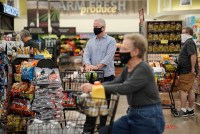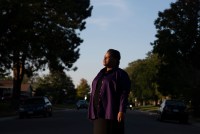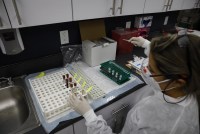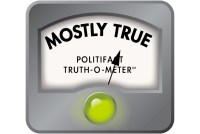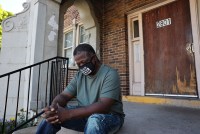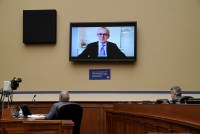Latest KFF Health News Stories
Lifetime Experiences Help Older Adults Build Resilience to Pandemic Trauma
These seniors use coping strategies to keep them socially active yet safe from the coronavirus.
Fighting for Patient Protections While Attacking ACA — Hard to Have It Both Ways
Montana’s Matt Rosendale and many other Republican congressional candidates face the challenge of convincing voters they support safeguards on preexisting conditions even as they oppose the Affordable Care Act, which codifies those safeguards.
One School, Two Choices: A Study in Classroom vs. Distance Learning
Most students at one Marin County school attend in person, while a dozen study from home. Those on campus are constantly nagged to use hand sanitizer and submit to the thermometer. Home-schoolers yell to their parents for help, while the parents pray that Zoom doesn’t freeze.
‘No Mercy’ Chapter 2: Unimaginable, After a Century, That Their Hospital Would Close
After Mercy Hospital Fort Scott shut its doors, investigative reporter Sarah Jane Tribble traveled to Kansas and spent time with former hospital president Reta Baker and City Manager Dave Martin — to understand what their town lost.
Campus Dorm Resident Assistants Adjust to a New Role: COVID Cop
Students charged with keeping their peers in line on college campuses say they are dealing with hostility, unclear policies and health risks as they try to enforce policies to prevent COVID-19.
Analysis: ‘Don’t Be Afraid of COVID’? Not Buying It, Unless Businesses Do Job Right
COVID precautions may seem like overkill. But I won’t set foot in a store unless certain steps are taken.
Easier-to-Use Coronavirus Saliva Tests Start to Catch On
Regulators and scientists have been leery of introducing the tests, preferring to rely on tried-and-true methods, but evidence is mounting that the spit and swab tests may be more convenient and just as accurate.
‘An Arm and a Leg’: TikTok Mom Takes On Medical Bills
Shaunna Burns went viral on TikTok, partly because of a series of videos dishing out real-talk advice on fighting outrageous medical bills.
Not Pandemic-Proof: Insulin Copay Caps Fall Short, Fueling Underground Exchanges
Although sharing prescription medicines is illegal, many people with diabetes are turning to underground donation networks when they cannot afford their insulin. Caps on insulin copays enacted in Colorado and 11 other states were designed to help. But the gaps between insulin costs and many patients’ financial realities are only widening amid the economic crisis of the COVID pandemic.
5 Things to Know About a COVID Vaccine: It Won’t Be a ‘Magic Wand’
Approval of a vaccine will be an important step in defeating COVID-19. But it won’t immediately end the pandemic.
Inside the Flawed White House Testing Scheme That Did Not Protect Trump
President Trump relied heavily on testing as protection against COVID exposure, eschewing masks and social distancing.
Trump’s COVID Program for Uninsured People: It Exists, but Falls Short
The help is real — but access to it isn’t easy.
Evictions Damage Public Health. The CDC Aims to Curb Them ― For Now.
A survey of 17 cities found more than 50,000 pandemic-related eviction filings. Housing advocates worry that increased housing instability will lead to more COVID-19 and other illnesses.
Old Drug Turned ‘Cash Cow’ as Company Pumped Price to $40K a Vial, Emails Show
The CEO of Mallinckrodt Pharmaceuticals defended the price hikes of Acthar gel, an orphan drug that treats infantile spasms at a House Oversight Committee hearing on Thursday.
Thousands of Minks Dead as COVID Outbreak Escalates on Utah Farms
COVID-19 is killing minks. So far, it appears infections likely spread from people to minks, not from minks to people.
KHN’s ‘What the Health?’: Election Preview: What’s Next for Health?
How will health issues affect voter choices? What will happen if President Donald Trump is reelected or the White House goes to Joe Biden? In this special election preview episode, Margot Sanger-Katz of The New York Times, Joanne Kenen of Politico and Rebecca Adams of CQ Roll Call join KHN’s Julie Rovner to discuss these issues and more.
The Mask Hypocrisy: How COVID Memos Contradict the White House’s Public Face
When in public, President Donald Trump and Vice President Mike Pence join crowded rallies where many do not wear masks. Behind the scenes, the White House is recommending states adopt mask mandates and even fines — leaving it up to local officials to handle the consequences.
To Free Doctors From Computers, Far-Flung Scribes Are Now Taking Notes For Them
Paid even less than low-wage doctors’ scribes in the United States, remote note takers in India gain a foothold in a rapidly expanding industry.
Analysis: We Follow Laws on Seat Belts and Smoking. Why Not on Masks?
Americans have gotten used to all sorts of mandates, from cleaning up after dogs to stopping at intersections. There’s no reason it should be this hard to enforce ones around the coronavirus.
Sky-High Drug Prices Driven by Pharma Profits, House Dems Charge
Democrats on the House Oversight Committee released a damning investigation Wednesday of drug company pricing tactics and profits, as two days of hearings with testimony from pharmaceutical industry CEOs begin.




